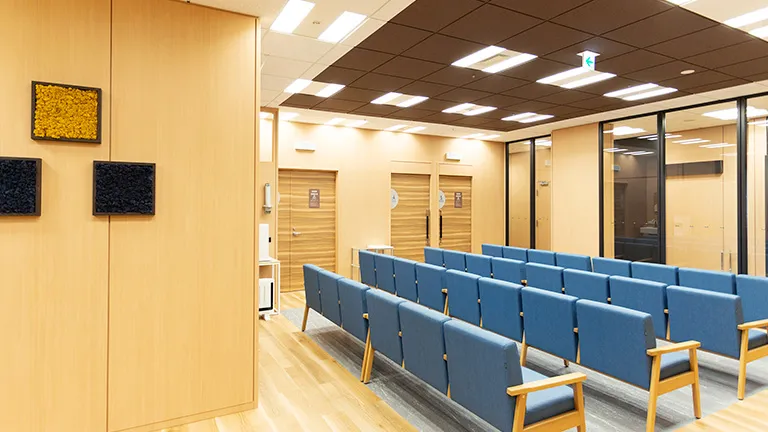
Vaccination and vaccination
List of vaccinations and vaccines
Tokyo Midtown Clinic offers a wide range of vaccinations to help prevent a variety of infectious diseases and take precautions before traveling abroad.
We can deliver polio vaccines, meningococcal vaccines, triple vaccines, and HPV vaccines (Gardasil, Sylgard 9) at any time, so please feel free to contact us by phone.
The fee is for one vaccination. In addition, there will be additional costs such as an initial consultation fee and a follow-up consultation fee.
Depending on the type of vaccine, a separate pre-counseling fee may be charged. Please contact us for more information.
- Malaria prevention drug "Mefloquine (Mefalquin®") is currently temporarily unavailable.
There are diseases that can be prevented by vaccination
As we age, our bodily functions, such as our immune system and physical strength, decline, making us more susceptible to infectious diseases such as pneumonia and shingles.
Vaccination has the advantage of preventing these infectious diseases and reducing the severity of the illness if it does occur.
Vaccines in the spotlight
Preventing pneumonia and reducing its severity
Incidence increases from age 50 onwards. Approximately 90 % can be prevented.
| Vaccine Name | Transmission | Eligible persons | Inoculation Method/expiration date | Price (tax included) |
|---|---|---|---|---|
| Hepatitis A vaccine | Ingestion of food or drink contaminated with feces of an infected person, or contact with an infected person. | Travelers to countries or regions with poor sanitation. | 8,800JPY | |
| Hepatitis B vaccine | Contact with infected people, exposure to blood and body fluids. Mother-to-child transmission. | Medical workers. People who have been staying in endemic areas for a long time. (There is a risk of infection through medical procedures such as blood transfusions.) | 7,810JPY | |
| Tetanus toxoid | Wounds and puncture wounds during outdoor activities (if soil gets into the wound) | Those staying overseas for a long period of time. Those taking part in outdoor activities or relief activities. | 4,400JPY | |
| Japanese Encephalitis Vaccine | A mosquito carrying the Japanese encephalitis virus sucks blood. | Long-term residents in suburban and rural areas of Southeast Asia. | 6,600JPY | |
| Pneumococcal vaccine (Pneumovax NP®) | Infection by inhalation of pneumococcus or nasal carriage | Elderly people aged 65 or older and people at high risk of pneumococcal infection and serious illness | 11,000JPY | |
| Pneumococcal vaccine (Prevnar 13®) | Infection by inhalation of pneumococcus or nasal carriage | Elderly people aged 65 or older and people at high risk of pneumococcal infection and serious illness | 15,400JPY | |
| Shingles vaccine (Shingrix®) | The varicella-zoster virus in the body becomes active again, causing the disease. | Adults aged 50 and over | (Clinical trials ongoing) | 27,500JPY |
| Influenza vaccine (Mid-October to March) | Droplet infection from an infected person | Anyone with no contraindications to influenza vaccination. | Varies by year | |
| HPV vaccine "Sylgard 9®' Read More | Mainly transmitted by sexual intercourse | Our clinic targets women aged 16 or older or those who have graduated from junior high school. | 38,500 yen (3-session set: 110,000 yen) | |
| HPV vaccine "Gardasil®' Read More | Our clinic is for people aged 16 or older or those who have graduated from junior high school. | 22,000 yen (3 times 66,000 yen) | ||
| Measles vaccine | Airborne infection from an infected person | People who have never had measles and have never received the measles vaccine. | 7,700JPY | |
| Rubella vaccine | Droplet infection from an infected person | People who have never had rubella and have never received the vaccine. | 7,700JPY | |
| MR vaccine (Measles and rubella combined) | Airborne and droplet infection from infected individuals | People who have never had measles or rubella and have never received the vaccine. | 11,000JPY | |
| Mumps vaccine | Droplet infection from an infected person | People who have never had mumps and have never received the vaccine. | 7,700JPY | |
| Chickenpox vaccine (Chickenpox) | Airborne infection from an infected person | People who have never had chickenpox and have never received the vaccine. | 9,900JPY |
| Vaccine Name | Transmission | Eligible persons | Inoculation Method/expiration date | Price (tax included) |
|---|---|---|---|---|
| Typhoid vaccine (Typhim Vi®) | Ingestion of food or drink contaminated with feces of an infected person, or contact with an infected person. | Travelers to countries or regions with poor sanitation. | 12,100JPY | |
| Rabies vaccine (verorab®) | A bite from a mammal infected with the rabies virus. | Long-term residents of developing countries, those with a high probability of coming into contact with animals, and those staying in remote areas where it is difficult to seek medical attention promptly. | 16,500JPY |
| malaria Preventive medications | Transmission | Eligible persons | How to take/Expiration date | Price (tax included) |
|---|---|---|---|---|
| *This product is currently temporarily unavailable. Mefloquine (Mephaquine®) | Blood-sucking by Anopheles mosquitoes | Travelers to malaria-endemic areas | Take one tablet orally per week. Take one tablet one week before entering an endemic area, then take one tablet per week during the trip, and after returning home, continue taking one tablet per week for four weeks. / Effective while taking the drug | 1 tablet 1,400 yen |
| Doxycycline | Blood-sucking by Anopheles mosquitoes | Travelers to malaria-endemic areas | Take one tablet orally per day. Start taking the medicine one day before entering the endemic area and take it every day, then take one tablet per day for four weeks after returning home. / Effective while taking the medicine | Outpatient prescriptions (self-paid prescriptions) |
| Atovaquone and Prognil (Malarone®) | Blood-sucking by Anopheles mosquitoes | Travelers to malaria-endemic areas | Take one tablet per day. Take one tablet per day before entering an endemic area, take it every day, and take it for 1 days after returning home. / Effective while taking the medicine | 1 tablet 830 yen |
There will be a separate consultation fee for vaccinations and self-paid prescriptions.
- Please note that all fees may change without notice.
Precautions
- Vaccinations for travel, business trips, and overseas postings (travel vaccines) are determined by the destination, duration, season, region, and purpose of the trip, and the type and schedule of recommended vaccines will be decided accordingly. There may be cases where some vaccines are not in stock, so please call us before coming for a consultation.
Some vaccines require multiple doses, so it is best to start vaccinations at least two months in advance, so please contact us as soon as your travel dates have been decided. - In principle, vaccinations cannot be administered during pregnancy, but influenza virus vaccinations are recommended for pregnant women, so they can be administered.
- If you are undergoing treatment that weakens your immune system, such as chemotherapy or steroids, please check with your doctor to see if you can receive the vaccine.
For those who are eligible for vaccinations
Precautions before taking the test (please read carefully)
01 Side effects of vaccinations
Mild side effects
You may experience redness, swelling, or itching at the injection site, but these will usually subside naturally, so there is no need to worry. However, if you experience a severe reaction, please contact us.
Strong side effects
Although it is extremely rare, a strong allergic reaction may occur within 30 minutes to an hour after vaccination, causing hives, difficulty breathing, and a drop in blood pressure. In this case, emergency treatment is required. Please monitor yourself for an hour after the injection, and if any symptoms appear, contact a hospital immediately.
02 Simultaneous vaccination
If there is limited time before departure, simultaneous vaccinations (vaccination of two or more vaccines on the same day) may be performed. This is a method that is actually widely used in other countries, and in Japan, the vaccination guidelines state that "if a doctor deems it necessary, simultaneous vaccinations may be performed," and there are no laws prohibiting this. Most people at our clinic use this method.
However, if you are to receive both vaccinations at the same time, you will need to agree that in the extremely rare event that a serious side effect occurs after receiving the vaccinations, there is currently no sufficient relief system in place under Japanese law, and you will be responsible for any consequences. Therefore, please note that we will ask you to sign a separate consent form before receiving the vaccination.
03 Unapproved vaccines
Rabies and typhoid fever are rare in Japan, but if diagnosis is delayed, they can be fatal, and vaccines are recommended for those planning to travel to endemic areas for long periods of time. Unfortunately, these vaccines are not approved in Japan. In addition, domestic rabies vaccines are sometimes not in stable supply when domestic demand increases, so our clinic imports and provides vaccines that are approved and commonly used overseas.
Although this vaccine has not been approved in Japan, it is approved and widely used overseas. In most cases, the vaccination is administered without any problems, but there is a possibility that side effects may occur, ranging from mild local reactions to extremely rare cases of serious side effects or poor physical condition. If any side effects occur, unlike vaccinations approved in Japan, legal guarantees and relief systems will not apply, so you must agree to take responsibility for any such side effects.
Precautions after vaccination
- Please monitor yourself for about an hour after the vaccination. Although extremely rare, serious side effects (anaphylaxis) usually occur within 30 minutes.
- There is no problem with taking a bath on the day.
- Please refrain from drinking alcohol or engaging in strenuous exercise within 24 hours of receiving the vaccine.
- If you experience any symptoms that you believe to be side effects after vaccination or have any concerns, please contact our clinic.
Frequently asked questions about vaccinations
- What is a vaccine?
Vaccines are medicines that use the immune system to prevent various infectious diseases.
Vaccination helps build immunity in the body against viruses and pathogens, thereby preventing infectious diseases.
Even if you do get an infection, it may be possible to reduce the severity of the infection.- What are "live vaccines" and "inactivated vaccines"?
A "live vaccine" is a vaccine that has been created by weakening or neutralizing the toxicity of viruses or bacteria so that they do not have any adverse effects in the body. After vaccination, the weakened viruses or bacteria gradually multiply in the body, allowing the body to build up immunity in a state close to natural infection.
"Inactivated vaccines" are made from raw materials that have had the infectiousness of viruses and bacteria eliminated through chemical processing, etc. Compared to "live vaccines," the immune system produced in the body is weaker, so many inactivated vaccines require multiple doses.- Are there any side effects?
Vaccines can cause side effects, but most are mild.
Redness, swelling, and itching may occur at the injection site, but these usually subside on their own.
In extremely rare cases, severe allergic reactions, hives, difficulty breathing, and low blood pressure may occur."Precautions for those who are to receive vaccinations"
Doctor introduction

Ikumi Genkawa
Tokyo Midtown Clinic
Full-time doctor/Infectious disease specialist
- Biography
- Graduated from Nihon University School of Medicine in 1991. Doctor of Medicine. Worked in the infectious disease and travel outpatient department at the National Center for Global Health and Medicine, where he continues to work today.
- Certifications
- Certified physician and specialist of the Japanese Society of Internal Medicine, specialist of the Japanese Association of Infectious Diseases, and certified physician of the International Society of Travel Medicine



